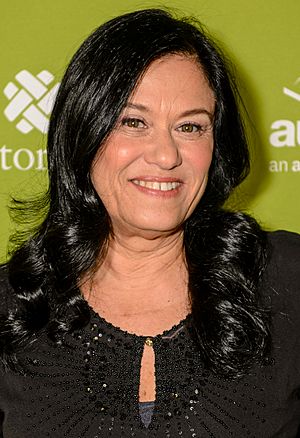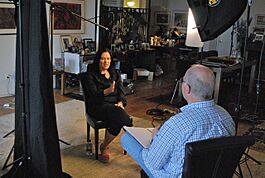Barbara Kopple facts for kids
Quick facts for kids
Barbara Kopple
|
|
|---|---|

Kopple at the May 2015 Montclair Film Festival
|
|
| Born | July 30, 1946 New York City, U.S.
|
| Occupation | Film director |
Barbara Kopple (born July 30, 1946) is an American film director famous for her documentaries. A documentary is a movie that shows real-life events and people. She is known for helping to make a style of filmmaking called cinema vérité popular in America. This style is like being a "fly on the wall," where the camera records life as it happens.
Kopple has won two Academy Awards, also known as Oscars. She was the first woman to win two Oscars for Best Documentary. Her first win was for Harlan County, USA (1977). This film tells the story of a coal miners' strike in Kentucky. Her second Oscar was for American Dream (1991), which was about a factory workers' strike in Austin, Minnesota.
She has directed many other important films. These include Wild Man Blues (1997), A Conversation With Gregory Peck (1999), and Miss Sharon Jones! (2015). She also directed episodes of popular TV shows like Homicide: Life on the Street and Oz. In 2023, she received a Lifetime Achievement Award for her amazing work in television.
Contents
Early Life and School
Barbara Kopple was born in New York City. She grew up on a vegetable farm in Scarsdale, New York. Her father was an executive in the textile, or cloth, industry. Her uncle, Murray Burnett, co-wrote the play that the famous movie Casablanca was based on.
Kopple went to Northeastern University, where she studied political science and psychology. For one class, instead of writing a paper, she made her first film. It was about Vietnam veterans. This experience helped her realize she wanted to be a filmmaker. She felt that films could share stories with more people than a written paper could.
Career as a Filmmaker
After college, Kopple went to the School of Visual Arts. There, she met the famous documentary filmmakers Albert and David Maysles. She began working with them, helping on their films Salesman and Gimme Shelter, which was about the Rolling Stones. Kopple said the Maysles brothers treated everyone on their team as equals, which was a great experience.
In 1972, she started her own production company called Cabin Creek Films. Through this company, she has directed and produced many documentaries, movies, and TV shows.
Harlan County, USA
In the early 1970s, Kopple learned about the difficult lives of coal miners in Appalachia. In 1972, miners in Harlan County, Kentucky, went on strike. A strike is when workers refuse to work to demand better pay or safer working conditions. Kopple and a small crew moved to Harlan to film the events.
She and her team lived with the miners and their families. This allowed them to capture the real story of the strike. Making the film was very difficult. It took four years and a lot of money. Kopple often had to return to New York to raise money before she could go back to filming in Kentucky. She even used her own credit card to help pay for the movie.
Filming could also be dangerous. The mine owners were not happy about the film being made. Kopple showed great bravery to get the story. Harlan County, USA was a huge success. It won an Academy Award for Best Documentary Feature. When she accepted the award, she thanked the miners of Harlan County for trusting her and sharing their lives.
American Dream
Kopple's next major documentary was American Dream. This film followed a long strike by workers at the Hormel Foods company in the mid-1980s. It took Kopple five years to get the money to make this film.
In American Dream, Kopple wanted to show all sides of the story. She showed the perspectives of the striking workers, the workers who did not strike, and the company leaders. "I cared about the people... very much," Koppe said, "but if we were ever to look back at [the film], we had to have the full story."
American Dream premiered in 1990 and was a great success. It earned Kopple her second Academy Award.
Shut Up and Sing
In 2006, Kopple and director Cecilia Peck released Shut Up and Sing. The film follows the music group the Dixie Chicks (now known as The Chicks). It shows what happened after the lead singer, Natalie Maines, made a comment about the president and the war in Iraq during a concert.
The comment caused a lot of controversy. Many radio stations stopped playing their music, and the group faced angry crowds. Kopple's film shows how the musicians dealt with this difficult time. It uses her "fly on the wall" style to show their private moments and their public challenges. The film shows the personal cost of speaking out.
Filmmaking Style
Kopple makes documentaries in a style called cinema vérité, which is French for "truthful cinema." This means she tries to capture reality as it happens, without interfering. Her films often have very little narration. Instead, she lets the people in the film tell their own stories through their actions and words.
"I really love people, and I love telling their stories," Kopple has said. She wants her films to feel intimate and personal, as if the viewer is right there with the subjects.
Many of her films are about political topics, especially workers' rights. In recent years, she has also made films about famous musicians and other celebrities. No matter the topic, she always works with a small crew and often operates the sound equipment herself.
Filmography
Here is a list of some of Barbara Kopple's most well-known films:
- 1972: Winter Soldier
- 1976: Harlan County, USA
- 1990: American Dream
- 1993: Fallen Champ: The Untold Story of Mike Tyson
- 1997: Wild Man Blues
- 1999: A Conversation with Gregory Peck
- 2000: My Generation
- 2005: Havoc
- 2006: Shut Up & Sing
- 2010: 30 for 30: The House of Steinbrenner
- 2013: Running from Crazy
- 2015: Miss Sharon Jones!
- 2016: Gigi Gorgeous: This is Everything
- 2019: Desert One
- 2022: Gumbo Coalition
Awards and Honors
| Year | Association | Category | Nominated work | Result | Ref. |
|---|---|---|---|---|---|
| 1977 | Academy Award | Best Documentary Film | Harlan County, USA | Won | |
| 1991 | American Dream | Won | |||
| 1993 | Primetime Emmy Awards | Outstanding Individual Achievement – Informational Programming | Fallen Champ: The Untold Story of Mike Tyson | Won | |
| 1995 | Outstanding Informational Series | A Century of Woman | Nominated | ||
| 2014 | Outstanding Documentary or Nonfiction | Running from Crazy | Nominated | ||
| 1992 | Directors Guild of America Award | Outstanding Directorial Achievement in Documentaries | American Dream | Won | |
| 1994 | Fallen Champ: The Untold Story of Mike Tyson | Won | |||
| 1998 | Outstanding Directorial Achievement in Dramatic Series | Homicide: Life on the Street | Won | ||
| 1991 | Sundance Film Festival | Grand Jury Prize | American Dream | Won | |
| Filmmakers Trophy | Won | ||||
| Audience Award | Won | ||||
| 1998 | Grand Jury Prize | Wild Man Blues | Nominated |
Other Awards
- 1998: Human Rights Watch International Film Festival, Lifetime Achievement Award
- 2006: Woman Film Critics Circle Awards, Lifetime Achievement Award
- 2018: Athena Film Festival, Laura Ziskin Lifetime Achievement Award
See also
 In Spanish: Barbara Kopple para niños
In Spanish: Barbara Kopple para niños
- List of female film and television directors
- American film directors
- Women's cinema
- Cinéma vérité
 | Toni Morrison |
 | Barack Obama |
 | Martin Luther King Jr. |
 | Ralph Bunche |


